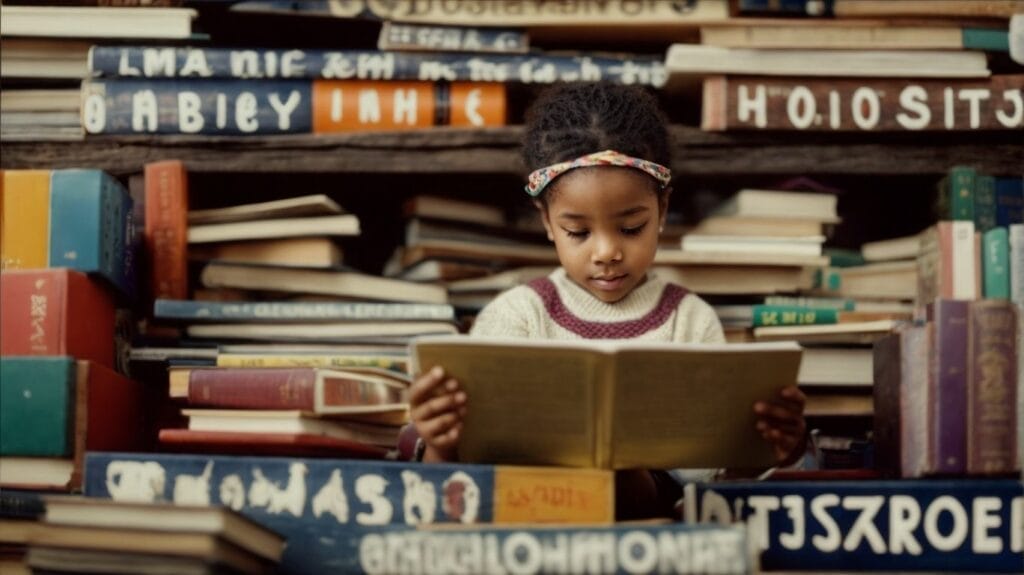Children’s literature holds a special place in the hearts of both young readers and the adults who share these stories with them. It plays a pivotal role in shaping young minds and fostering a love for reading. In recognition of the significance of children’s books, numerous organizations and institutions around the world have established prestigious awards to honor outstanding works in this genre. These awards not only celebrate exceptional storytelling and artistic expression but also contribute to the growth and development of children’s literature.
This article serves as a comprehensive guide to children’s book awards, covering their importance, different categories, criteria, benefits, and impact on the landscape of children’s literature. Whether you’re an aspiring children’s book author, an avid reader, or a parent seeking quality reading materials for your child, understanding the world of children’s book awards is essential. So, let’s embark on an enlightening journey through the realm of children’s book awards and uncover the magic they bring to the world of literature.
Key Takeaways:
- Children’s Book Awards recognize and celebrate the best children’s literature, highlighting the importance of quality books for young readers.
- Winning a Children’s Book Award can have a significant impact on an author’s career, providing recognition and exposure for their work.
- Organizations such as the American Library Association offer valuable resources for authors and readers interested in learning more about Children’s Book Awards and the impact they have on children’s literature.
Introduction to Children’s Book Awards
Children’s Book Awards play a pivotal role in acknowledging and celebrating outstanding literary works designed for young readers. These accolades recognize the profound impact of literature on young minds, offering a platform to honor the creativity and excellence within the realm of children’s books. The awards also serve as a testament to the dedication of authors and illustrators in crafting engaging and enriching content for children, fostering a love for reading and storytelling from an early age.
What are Children’s Book Awards?
Children’s Book Awards encompass a diverse range of accolades and honors bestowed upon literary works specifically tailored for young readers. These awards recognize the exceptional contributions of authors, illustrators, and publishers in creating captivating and educational content that resonates with children of varying ages and backgrounds.
The American Library Association (ALA) and the National Council for Social Studies play crucial roles in organizing and presenting these awards, ensuring that the literary landscape for children remains vibrant and diverse. While ALA’s Newbery Medal highlights outstanding contributions to children’s literature, honoring books that exemplify literary excellence, the Pura Belpré Award specifically celebrates the Latino cultural experience through literature.
These awards not only commend literary merit but also promote inclusivity and cultural awareness, enabling young readers to explore diverse perspectives and themes.
Importance of Children’s Book Awards
Children’s Book Awards hold immense significance in the literary world as they not only recognize outstanding works but also contribute to the promotion of literacy, creativity, and cultural awareness among young readers.
These prestigious awards not only highlight the talent of authors and illustrators but also play a crucial role in shaping the reading habits and preferences of the younger generation. Through the celebration of diverse voices and stories, Children’s Book Awards foster inclusivity and convey powerful messages that resonate with the experiences of children from various backgrounds.
The recognition and honor bestowed by entities like the American Library Association (ALA) and the National Council for Social Studies not only elevate the selected works but also signal the societal importance of collaborating towards literary and cultural enrichment.
Overview of Different Children’s Book Awards
The realm of children’s book awards encompasses a rich tapestry of accolades and honors, including esteemed recognitions such as the Newbery Medal, Caldecott Medal, Pura Belpré Award, and the Michael L. Printz Award, each catering to distinct genres, themes, and age groups within children’s literature. Organizations like the American Library Association (ALA), the National Council for Social Studies, and the Consortium of Latin American Studies Programs offer a diverse array of prestigious awards that highlight the multifaceted nature of children’s literature and its impact.
The Newbery Medal, established by the American Library Association (ALA), is renowned for recognizing outstanding contributions to children’s literature and has become a benchmark for literary excellence. In parallel, the Caldecott Medal, also administered by the ALA, honors exceptional illustrations in children’s books, emphasizing the crucial role of visual storytelling.
The Pura Belpré Award, co-sponsored by the ALA and the National Council for Social Studies, celebrates the vibrant narratives and cultural significance portrayed in Latino children’s literature.
Equally notable is the Michael L. Printz Award, administered by the ALA’s Young Adult Library Services Association. This accolade distinguishes exceptional young adult literature, amplifying diverse voices and thought-provoking themes that resonate with adolescent readers. The Consortium of Latin American Studies Programs contributes to this expanse of recognition by presenting awards that highlight the rich heritage and diversity of Latin American children’s literature, further enriching the mosaic of literary honors available to young readers.
Popular Children’s Book Awards
The landscape of children’s book awards is adorned with prestigious accolades that recognize exceptional literary contributions designed for young readers. From the revered Newbery Medal and Caldecott Medal to the culturally significant Pura Belpré Award and the thought-provoking Michael L. Printz Award, these honors showcase the breadth and depth of children’s literature, reflecting the diverse voices and narratives that enrich the literary world for young audiences.
American Library Association (ALA) Awards
The American Library Association (ALA) stands at the forefront of recognizing exceptional children’s literature through a myriad of prestigious awards, including the Newbery Medal, Caldecott Medal, Odyssey Award, Theodor Seuss Geisel Medal, and the Sibert Informational Book Medal. These accolades not only celebrate literary excellence but also contribute to the perpetuation and enrichment of children’s literature, fostering a lifelong love for reading and learning.
These awards play a pivotal role in shaping the literary landscape for young readers as they shine a spotlight on outstanding works that captivate, educate, and inspire. The Newbery Medal, established in 1922, recognizes the most distinguished contribution to American literature for children, encouraging authors to push the boundaries of storytelling and creativity.
Similarly, the Caldecott Medal, named after the renowned illustrator Randolph Caldecott, honors the most distinguished American picture book for children, showcasing the significance of visual storytelling and artistic expression for young audiences.
The Odyssey Award, Theodor Seuss Geisel Medal, and the Sibert Informational Book Medal each cater to specific genres and formats, emphasizing the broad spectrum of exceptional literature available for children and adolescents. By acknowledging and celebrating these diverse literary forms, the ALA awards play a crucial role in nurturing a deep-seated appreciation for reading and cultural enrichment among young readers.
Other Major Organizations’ Awards
Plus, the esteemed accolades offered by the American Library Association (ALA) and other major organizations, such as the National Council for the Social Studies and the Consortium of Latin American Studies Programs, also bestow noteworthy awards that recognize the cultural, historical, and educational significance of children’s literature. These organizations play a pivotal role in amplifying diverse narratives and promoting literacy among young readers through their esteemed accolades.
The National Council for Social Studies (NCSS) focuses on highlighting children’s literature that aligns with the social studies curriculum, encouraging a deeper understanding of historical events and diverse societies. The Consortium of Latin American Studies Programs (CLASP) emphasizes the importance of diverse narratives and multicultural perspectives in children’s literature, enriching young readers’ appreciation for global cultures and histories.
Criteria for Children’s Book Awards
The selection process for children’s book awards encompasses rigorous criteria that evaluate the literary merit, educational value, cultural relevance, and artistic excellence of the nominated works. Authors, illustrators, and publishers are assessed based on their capacity to engage young readers, convey meaningful narratives, and contribute to the enrichment of children’s literature, ensuring that only the most exceptional works are celebrated and honored.
Eligibility and Submission Requirements
Authors, illustrators, and publishers aspiring for children’s book awards must adhere to specific eligibility and submission requirements outlined by the awarding organizations. These requirements encompass diverse aspects such as the publication date, target audience, thematic relevance, and adherence to ethical and cultural guidelines, ensuring that the nominated works align with the esteemed standards set by the awarding bodies.
Regarding publication date, many children’s book awards require nominated works to have been published within a specified timeframe, often within the previous calendar year. The thematic relevance of the content plays a crucial role, as the themes should be engaging, educational, and age-appropriate for the intended audience. Ethical considerations and cultural sensitivity are paramount, emphasizing the need for narratives to foster inclusivity and respect for diverse perspectives. These multifaceted criteria underscore the comprehensive nature of the submission requirements, enjoining authors, illustrators, and publishers to produce works that resonate with the essence of the awarding organizations’ esteemed standards.
Judging Process
The judging process for children’s book awards entails a meticulous evaluation conducted by esteemed literary professionals, educators, and experts within the field of children’s literature. These judges carefully assess the nominated works based on predefined criteria, ensuring that the winning selections epitomize the highest standards of literary excellence, cultural relevance, and educational impact, reflecting their profound influence on young readers.
The judges delve into the narrative quality, storytelling techniques, and the overall impact of the books on the target age groups. They consider the authenticity of characters, the depth of themes, and the originality of the content to gauge how effectively the work resonates with its intended audience. Cultural relevance is also a key factor, as the judges seek stories that embrace diverse perspectives, encourage inclusivity, and promote understanding across varying cultures and backgrounds. The educational impact encompasses the potential for stimulating intellectual curiosity, nurturing a love for reading, and instilling valuable life lessons.
Benefits of Winning a Children’s Book Award
Winning a children’s book award bestows significant benefits on authors, illustrators, and publishers, including enhanced visibility, a boost in book sales, and heightened recognition within the literary community. Moreover, these accolades serve as a testament to the creative prowess and cultural significance of the acclaimed works, amplifying their impact on young readers and fostering a deeper appreciation for children’s literature.
Impact of Children’s Book Awards on Children’s Literature
Children’s book awards wield a profound impact on the landscape of children’s literature, influencing the production, recognition, and consumption of diverse literary works designed for young readers. These accolades not only elevate the standards of children’s literature but also foster an environment where creativity, cultural representation, and educational value are celebrated, shaping a vibrant and inclusive literary realm for children of varying backgrounds and experiences.
Resources for Children’s Book Awards
Numerous resources are available to support and promote the diverse array of children’s book awards, ranging from comprehensive guides and reading lists provided by the American Library Association (ALA) to the initiatives and educational materials championed by the National Council for the Social Studies. These resources not only serve as valuable tools for educators, librarians, and parents but also contribute to the widespread recognition and appreciation of exemplary children’s literature that resonates with young readers of varying cultural backgrounds.
ALA’s Resources for Children’s Book Awards
The American Library Association (ALA) offers an extensive array of resources dedicated to supporting and promoting the recognition of exceptional children’s literature through its various awards and honors. These resources include curated reading lists, educational materials, and professional development opportunities aimed at amplifying the impact and reach of acclaimed children’s books within diverse educational and community settings.
These resources provided by the ALA are invaluable for educators, librarians, and parents seeking to integrate high-quality children’s literature into their programs and homes. The ALA’s notable awards, such as the Caldecott Medal and the Newbery Medal, serve as prestigious endorsements for outstanding children’s books, guiding readers toward exceptional literary works.
The ALA offers:
- educational workshops
- webinars
- and conferences
That equips professionals with the tools and knowledge to effectively nurture a love of reading in young audiences. The ALA’s initiatives promote diversity and inclusivity in children’s literature, fostering a more comprehensive representation of cultures, identities, and experiences.
Other Organizations’ Resources
Plus, the resources offered by the American Library Association (ALA) and other prominent organizations, such as the National Council for the Social Studies and the Consortium of Latin American Studies Programs, provide valuable resources, reading lists, and educational materials to support and celebrate the recognition of children’s literature that reflects diverse cultural perspectives and historical narratives. These resources play a pivotal role in fostering an inclusive and enriching reading environment for young audiences.
The National Council for Social Studies offers a range of resources aimed at promoting the inclusion of diverse children’s literature, including curated reading lists, teaching guides, and professional development opportunities for educators. These resources are designed to encourage critical thinking and cultivate a deeper understanding of cultural diversity among young readers.
Likewise, the Consortium of Latin American Studies Programs contributes to the representation of Latin American literature in children’s books through extensive bibliographies, teaching materials, and virtual events. This initiative aims to broaden the perspectives within children’s literature and encourage intercultural understanding among young readers.
Conclusion
In conclusion, children’s book awards stand as a symbol of recognition, celebration, and advocacy for outstanding literary works designed for young readers. These accolades not only elevate the standards of children’s literature but also contribute to the amplification of diverse voices, cultural representation, and educational value within the literary landscape, fostering an inclusive and vibrant reading realm for children of varying backgrounds and experiences.
Significance of Children’s Book Awards
Children’s book awards hold immense significance in promoting the recognition and celebration of exceptional literary works tailored for young readers. These accolades not only honor the creative efforts of authors and illustrators but also contribute to the nurturing of a diverse and inclusive literary landscape for children, fostering a love for reading and storytelling while championing cultural representation and educational value.
These awards serve as a testament to the value that society places on quality literature for children, driving authors and illustrators to produce impactful and engaging content that sparks curiosity and empathy in young minds. Organizations such as the American Library Association (ALA) and the National Council for Social Studies play a crucial role in identifying and honoring these exceptional works, thereby elevating their significance within the educational and literary communities.
The representation of diverse voices from the Latino community and other cultural groups in award-winning children’s books not only enriches the reading experience for young audiences but also contributes to their broader understanding of the world around them.
Frequently Asked Questions
What are Children’s Book Awards?
Children’s Book Awards are annual or biennial events that recognize outstanding books written for children. These awards honor the best works in a variety of categories, including picture books, middle-grade novels, and young adult fiction.
Why are Children’s Book Awards important?
Children’s Book Awards are important because they bring attention to high-quality literature for young readers. They provide recognition for talented authors and illustrators and can help promote literacy and a love of reading in children.
Who can win the Children’s Book Awards?
Any author or illustrator who has created a book specifically for children can be eligible for a Children’s Book Award. Some awards also consider books that are suitable for young readers, even if they were not necessarily written for a younger audience.
How are the Children’s Book Awards chosen?
Children’s Book Awards are typically chosen by a panel of judges who have expertise in children’s literature. They may consider factors such as the book’s writing, illustrations, and overall impact on young readers. Some awards also have a public voting component.
What are some notable Children’s Book Awards?
There are many notable Children’s Book Awards, including the Caldecott Medal, Newbery Medal, and Coretta Scott King Book Awards in the United States, the Carnegie Medal in the United Kingdom, and the Astrid Lindgren Memorial Award in Sweden.
How can I find out about the upcoming Children’s Book Awards?
You can find out about upcoming Children’s Book Awards through various sources, such as book websites, publishing industry websites, and literary organizations. You can also follow book bloggers and book critics who often share information about upcoming awards and book releases.


